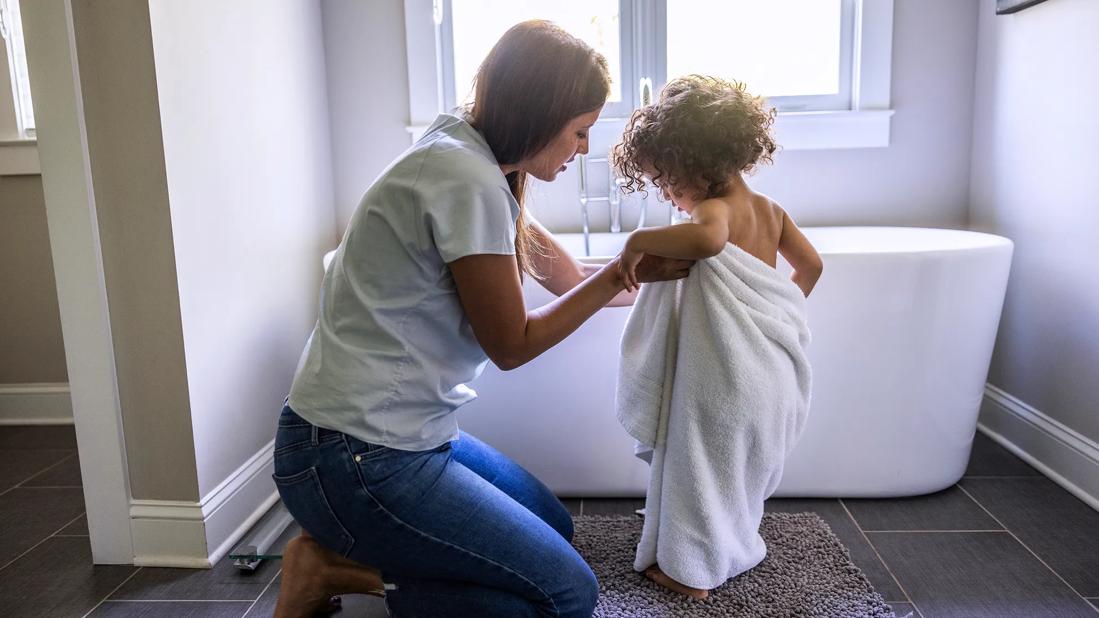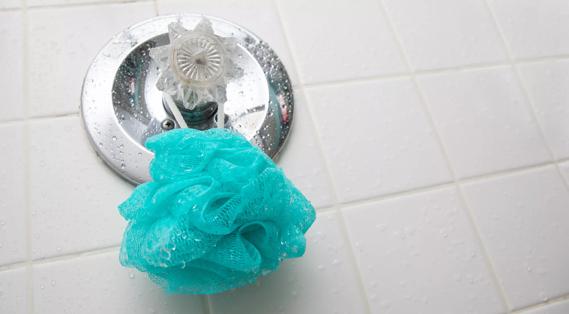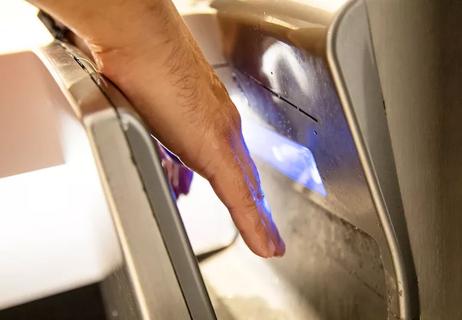Wash your bath towels at least once a week, and washcloths at least twice a week

There’s nothing like a good bath or shower. You lather up, rinse off and step out feeling clean, refreshed and energized. But if you grab a dirty towel, all of that time spent rub-a-dub-dubbing goes right out the window.
Advertisement
Cleveland Clinic is a non-profit academic medical center. Advertising on our site helps support our mission. We do not endorse non-Cleveland Clinic products or services. Policy
Yes, your towels need pampering, too. After all, they have a pretty rough life. But how often do they need pampering, exactly? And what happens if you forget for a few days or (no judgment) weeks?
In a world without water bills, busy schedules and an environment that needs protecting, using a new towel every day would be ideal. But that’s not the world we live in. We need a more practical approach.
So, we asked dermatologist Alok Vij, MD. The verdict: As a general rule, you should launder your bath towel (or swap in a clean one) at least once a week. The same goes for hand towels.
And your washcloth? That needs replacing more often — at least a couple times a week.
It’s not something we like to think about. But the fact is that germs, spores and particles of all sorts live on every surface we come in contact with, including — as a 2023 case study demonstrated — clean towels.
The human body also plays host to a wide range of organisms, some of which can make us sick. When we rub ourselves down with a towel, we transfer all that yucky stuff to the fabric. We also deposit the moisture, dead skin cells and other debris those creepy crawlies rely on to grow, multiply, and, most importantly, adapt to the conditions of the textile. They ultimately create a microbial community that, as a 2023 article in Scientific Reports found, is unique from the ones that form on our clothes or bed linens.
Advertisement
“The longer the towel stays damp, the longer the yeasts, bacteria, molds and viruses remain alive and stay active,” explains Dr. Vij.
“They can cause an outbreak of, or spread, fungal infections like athlete’s foot, ringworm and jock itch — and viral infections like warts,” he continues. “ Dirty towels can similarly cause a flare-up of eczema or atopic dermatitis.”
Towels can also become repositories for all sorts of allergens, especially if you keep your windows open.
Not gross enough for you? Strap in, because it’s about to get way worse.
When you dry off your nether regions, microscopic fecal particles and your assorted bodily fluids also make their way onto your towel. When you reuse it, you risk being exposed to infectious diseases like pink eye (conjunctivitis), medication-resistant staph (MRSA), norovirus, E. coli and more.
If you’re suddenly questioning your cleanliness, don’t worry. Dr. Vij offers some towel tactics that will instantly improve your post-shower hygiene.
There’s no such thing as a perfectly clean towel, but these basic laundry principles will get you pretty close:
As we’ve established, damp towels are a breeding ground for germs. So, hang your wet towel spread out on a towel bar (rather than from a hook) so it can dry thoroughly between uses.
When the air’s heavy with moisture, it makes it harder for your towels to dry. Launder your towels more often — two to three times weekly — if the humidity in your house is high.
This is particularly important, Dr. Vij says, during the summer months. And more important still if you don’t have air conditioning!
You’ve probably noticed that the gym towels that regulars carry from machine to machine don’t look like the towels you have hanging on your rack at home. “Microfiber towels dry faster than cotton, so they’re better for the gym,” Dr. Vij explains.
If you shower at the gym and your damp bath towel sits in your bag or locker for hours afterward, use a clean one daily.
“Workout towels get pretty disgusting — they’re stinky and smelly and full of bacteria,” he adds.
You know that saying, “sharing is caring”? It really needs an asterisk. Because — at least when it comes to towels — sharing is only caring under certain circumstances.
You can share towels with a spouse or partner (you share bed sheets, after all) as long as neither of you:
Advertisement
Children typically (let’s be honest!) have poor hand hygiene. They’re also more likely to have cuts, scrapes and skin conditions. So, it’s best to give them their own towels.
As for washcloths, it’s every man, woman and child for themselves — meaning don’t share, Dr. Vij advises.
Wash towels more frequently if you’re sick to avoid reinfection. Ditto if you have any injuries or skin conditions that lead to a damaged skin barrier, from cuts and surgical incisions to rashes, sores and abscesses.
Now that you realize you need to pay more attention to your towels, maybe you need to go shopping? That way you’ll always have a clean one within reach.
As far as fabric choice goes, plush towels with a high thread count are fine. (And they feel so good on your skin!) But keep in mind these towels take longer to dry. There are more quick-dry towel options on the market nowadays than ever before, made in a variety of ways with an ever-widening array of textiles. So, shop around and find the one that works best for you!
Always make sure your towel passes the smell test. A stinky whiff? Time for a fresh towel.
Advertisement
If your towel’s always stinky, no matter how much you wash it, it’s time to let it go. That, or reserve it for already-messy tasks, like drying your puppy’s paws after a romp in the mud.
Towels are an essential tool in your daily cleansing routine. But if you don’t care for them properly, they can become a vehicle for germs and debris. Wash your bath and hand towels at least once a week — more if you have a damaged skin barrier or live in an environment that keeps them from drying out completely. You need to launder your washcloths and gym towels even more often.
By following the washing instructions, sanitizing your washing machine and staying mindful about the who and when of sharing your towels, you can keep your personal hygiene from going down the drain.
Advertisement

Sign up for our Health Essentials emails for expert guidance on nutrition, fitness, sleep, skin care and more.
Learn more about our editorial process.
Advertisement

Follow these tips, like hand washing and self-care, to keep illness at bay as you celebrate the season

This puffy shower accessory can become lodged with skin cells (and other gross things), so make sure you dry it daily and clean it once a week

Some dryers spread germs instead of removing them

Over-the-counter antifungal creams usually get the job done, but it’s important to keep it from spreading in the meantime

Although it could be used as a moisturizer, this new trend is not recommended

The popular skin care ingredient can help smooth, brighten and strengthen your skin

Chilblain-like skin lesions and rashes are mild (and rare) complications of many viral infections, not just COVID-19

Yes, but symptoms can be easy to miss

Even small moments of time outdoors can help reduce stress, boost mood and restore a sense of calm

A correct prescription helps your eyes see clearly — but as natural changes occur, you may need stronger or different eyeglasses

Both are medical emergencies, but they are very distinct events with different causes